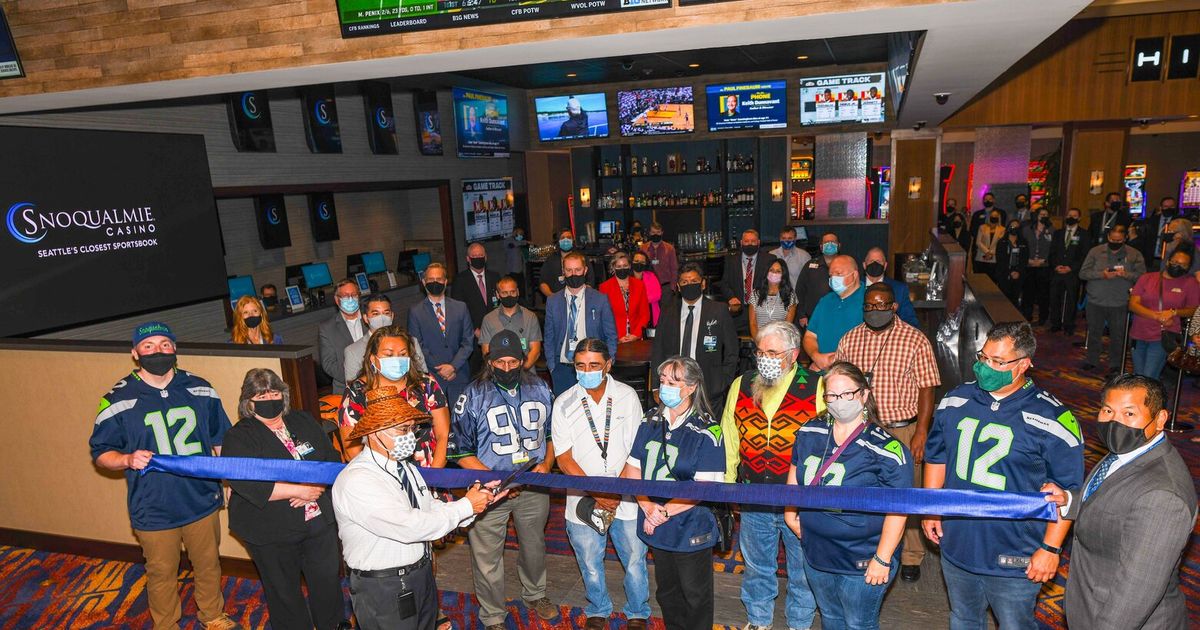
A federal court on Tuesday quashed a bid to strike down a Washington state law permitting legalized sports betting in tribal casinos only.
The ruling, which hinged largely upon the tribes’ sovereign immunity, is a blow to those hoping to see sports gambling expanded throughout the state. Kirkland-based Maverick Gaming, which owns and operates 22 card rooms throughout Washington, had filed a January 2022 lawsuit in U.S. District Court accusing state and federal officials of granting a “discriminatory tribal gaming monopoly” over sports betting and other gambling such as roulette and craps.
Maverick CEO Eric Persson issued a brief statement Tuesday night saying he will appeal to the U.S. Supreme Court.
Maverick had asked the district court to invalidate the state’s groundbreaking 2020 sports gambling law — which went into effect on a case-by-case basis in September 2021 — and indefinitely put any such wagering on hold pending new legislative efforts to expand it beyond tribal entities to card rooms and other facilities.
But Chief Judge David Estudillo of the U.S. District Court for the Western District of Washington ruled Tuesday on largely procedural grounds that the lawsuit itself posed “a substantial risk” to the “sovereign interests” of Indian tribes that had signed legal compacts on gambling with the state.
One of those tribes, Showalter Bay, had intervened in August, claiming its gambling activities would be unduly harmed if the lawsuit prevailed and that it was thus a “required party” to the case.
But the tribe also asserted that it enjoys “sovereign immunity” from being joined to such litigation and that the case therefore cannot proceed. Estudillo in Tuesday’s ruling agreed, stating the tribe could not be feasibly joined to the litigation to defend its interests and that moving ahead and revoking its gambling rights “threatens not only tribal revenue and contracts, but also tribal and non-tribal employment and other businesses.”
While Estudillo acknowledged there was no other judicial forum in which Maverick could seek to overturn the sports gambling law, he said legal precedent almost always favors dismissal when a tribe cannot be joined to a case due to its assertion of sovereign immunity.
Washington Attorney General Bob Ferguson, one of the named defendants in the lawsuit, hailed the ruling as “a significant victory for tribal sovereignty” at a time the state’s tribes rely on gambling revenue to fund needed social programs.
“Washington law strikes the right balance by permitting sports betting and confining it to tribal casinos, where tribes have experience carefully regulating gambling where individuals must be physically present,” Ferguson said in a release.
Ferguson’s office and 17 state tribes had filed briefs supporting Showalter Bay in its motion to have the case dismissed.
The nationwide push by states to legalize sports gambling took off after the Supreme Court in May 2018 struck down a federal law banning it in all but Nevada and a handful of jurisdictions. States were free to determine their own course and roughly two-thirds — including Washington — have approved some legalized sports wagering.
Washington had long had some of the nation’s toughest anti-gambling laws and any form of online wagering is considered a Class C felony. So, the state’s March 2020 decision to pass HB 2638 and grant even tribes-only sports gambling was seen as a major change.
Such betting is limited within casino grounds only, including any mobile wagering. A digital geofence security component restricts mobile sports wagering — the fastest growing sports gambling sector — to tribal casino grounds.
Snoqualmie Casino was the first to offer a sports betting book in time for the NFL season in September 2021. A total of 15 tribes now have sports betting agreements.
Maverick operated 18 state card rooms at the time its lawsuit was filed but two months ago expanded that number to 22. Card rooms — as the name implies — allow some betting on card games, but no slot machines, video lottery terminals, roulette wheels or other gambling.
In filing the lawsuit, CEO Persson said in an interview he’d also restrict any mobile sports wagering to his card room premises just as the law requires Native American casinos to do.
In a policy brief issued last month, Persson wrote: “I know that our perspective on sports betting is at odds with those who prefer a monopoly for Tribal casinos, but I respect their right to advocate for their members. Maverick Gaming will one day offer sports betting at its properties in our state, either following a ruling by the Supreme Court of the United States or an inclusive policy discussion by the state legislature that is founded in facts.”
But the Washington Indian Gaming Association, which promotes the benefits of tribal gambling, has long argued such betting vastly differs from commercial realm wagering. It states that revenues from gambling in tribal casinos support vital community self-government programs in housing, medical care and education.
“This is an important legal victory,” WIGA Executive Director Rebecca George said in a release. “Maverick’s lawsuit was a direct attack on the federal Indian Gaming Regulatory Act, which over the last three decades has been a pathway for tribes to regain their self-reliance by generating revenue to lift tribal communities out of poverty and despair.
“It is also a strong ratification of the collaborative and productive partnership that Washington’s tribes have developed with state and federal officials to create a safe, limited and well-regulated system of gaming in Washington State.”